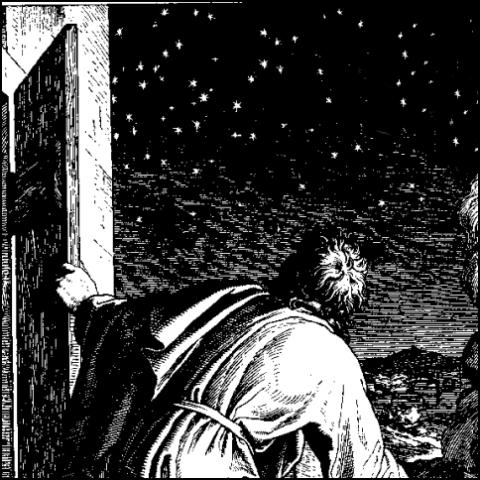For the week of November 12, 2016 / 11 Heshvan 5777
Lekh Lekha
Torah: Bereshit/Genesis 12:1 – 17:27
Haftarah: Isaiah 40:27 – 41:16
Download Audio [Right click link to download]
And he brought him outside and said, “Look toward heaven, and number the stars, if you are able to number them.” Then he said to him, “So shall your offspring be.” And he believed the LORD, and he counted it to him as righteousness. (Bereshit/Genesis 15:6)
Against the backdrop of the dismal failure of the grand, but misguided, attempt at building the city and tower of Babel is the introduction of one of the most influential persons to have ever lived. Novice readers of the Bible might be surprised to learn that not much is known about Abraham. But the Bible isn’t a biography or a collection of biographies. There is certainly biographical material in it, but in most cases not enough to paint a full picture of any of its characters. Yet, what is written is sufficient for the purpose of Holy Scripture: that readers could truly know God and live effective godly lives.
This is certainly true of the glimpses we have into the person and life of Abraham. For in him we encounter the basic model of a person of faith. And faith is the single most important component of true godliness. Without it, it is impossible to please God (see Hebrews 11:6). It was Abraham’s trust in God’s promise that put him into right relationship with God as we read: “he believed the LORD, and he counted it to him as righteousness” (Bereshit/Genesis 15:6).
God told this elderly, childless man that he would have innumerable descendants, and Abraham believed him. In that moment, this one man confronted everything that had ever gone wrong in the world. Adam and Eve unleashed God’s curse upon the world, because they didn’t trust his word; Abraham opened the door to blessing for all nations, because he embraced it. Years before God called Abraham to leave family and the familiar to go to an unknown land with an unknown agenda. This set the stage for God’s grand promise that his life would yet be extraordinarily fruitful. Contrary to normal expectations, Abraham’s affirmative heart’s response to God’s astounding promise set him apart as the father of all who walk in the restorative blessing of faith (see Galatians 3:7).
We shouldn’t be surprised when faith puts us at odds with the prevailing culture. Faith cuts through politically correct groupthink to rescue the broken and the lost. Those who prefer to remain in the grips of the curse will complain that the truths of faith upset their world, which of course it must do in order to break through the darkness of deception that is oppressing the masses.
Faith can’t be faked. You are either a child of Abraham or not. You can try to pretend, but in the end, your true identity will be apparent for all to see. Faith can get confused, however. You can find yourself conflicted as you struggle to hear God’s voice amidst the clamor all around us. But faithful ones know the voice of God and can never completely escape its veracity. People of faith may not always like what they hear God say, but they know it’s true. That’s why they can be so unsettled until they give in to its promptings. It’s why they never fully fit in with the crowd, no matter how much they try.
But why would we want to? What’s the benefit? Acceptance? Popularity? What will these things get us over time? And at what cost? Do you really want to spend your whole life being manipulated by society’s ever-changing expectations? Wouldn’t you rather be a source of positive change in the world, bringing the blessing of life wherever God may want you to go? Yes, it can hard at times. Abraham’s kids get lonely, are easily misunderstood, and suffer for our convictions. But it’s worth it.
It all starts by getting our eyes off ourselves and, like Abraham, looking up toward the heavens. God is waiting for you. He wants to tell you how you, like our father Abraham, are called to be a blessing to the world. Get ready. It’ll take a miracle. But you can trust him.
All scriptures, English Standard Version (ESV) of the Bible

